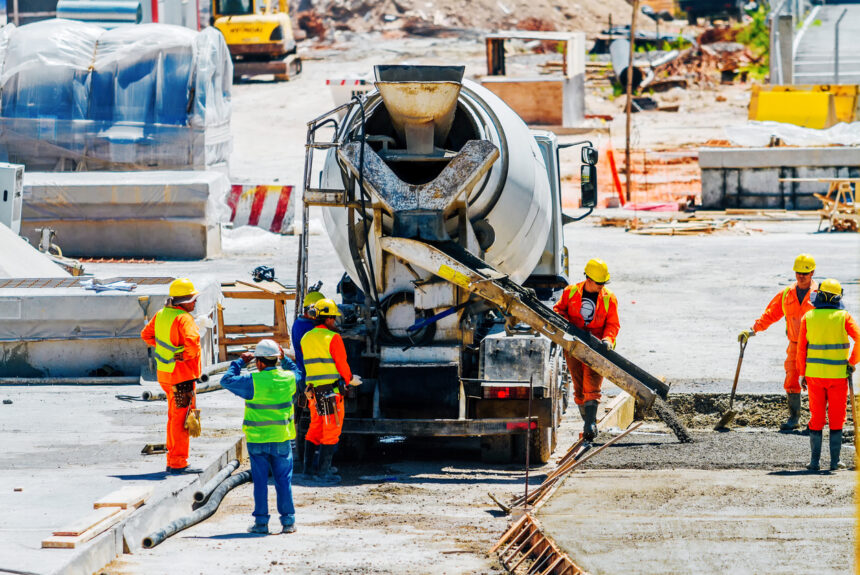Conventional cement, which is the primary binding agent in concrete, is a major source of global carbon dioxide (CO2) emissions due to its energy-intensive production process, reliance on raw materials, and limited recycling capabilities. As governments and industries look for economically feasible ways to reduce greenhouse gas emissions, cleaner, environmentally friendly alternatives to traditional ‘Portland’ cement are promising a potential pathway for rapid decarbonization. These green cement formulations are being aided by advancements in artificial intelligence (AI), which have played a vital role in identifying new materials for cement production as well as improving the production and supply chain efficiency of sustainable cement.
>>>READ: CarbonCure Technologies is Lowering the Concrete Industry’s Carbon Footprint
The industry is responsible for an estimated 8% of global emissions. Producing traditional cement involves heating limestone (calcium carbonate) and clay to extremely high temperatures in a kiln—which is often powered by coal or natural gas—to create clinker, an essential intermediate component of cement. This chemical process— known as ‘calcination’—releases vast amounts of CO2 into the atmosphere as a byproduct. Extracting and transporting the raw materials needed to form cement (e.g. limestone and clay) further contributes to the heavy environmental impact of the industry.
Fortunately, technologies at the intersection of AI and materials are promising a profound shift in the field. Cambridge University and UCL spinout Carbon Re, for instance, aims to accelerate a zero-carbon future with the help of AI models programmed to reduce energy consumption and optimize the performance of key industrial processes. The materials-focused AI company strives to expedite the decarbonization of foundational substances like cement by applying the latest breakthroughs in artificial intelligence and machine learning to a range of diverse sectors. Its signature ‘green’ cement, Delta Zero, releases 20% less fuel emissions than standard cement and cuts energy costs by 10%, generating estimated savings of $3 to $10 million per plant per year. In addition to targeting the cement sector, the company has identified the steel and glass industries as additional viable markets for its innovative decarbonization technology.
>>>READ: How Artificial Intelligence is Being Harnessed to Predict and Prevent Wildfires
CemAI is another startup that is disrupting the sector with its AI-based predictive maintenance solution for cement plants. Using advanced machine learning algorithms capable of detecting patterns in extensive datasets, CemAI’s 24/7 remote monitoring system can identify the operational indicators of failure in cement plants early on, before they affect businesses’ bottom line. Early detection of abnormalities helps CemAI’s partners save thousands of dollars in operational costs and more efficient energy use, which translates to fewer emissions produced. The solution is powered by Precognize’s proprietary AI software.
Among the emerging startups in the green materials sector, AICrete, a Silicon Valley company founded in 2020, offers the only ‘recipe-as-a-service platform’ for concrete producers. Founder and CEO of AICrete Parham Aghdasi stated in a press release that the company is able to reduce emissions by up to 35% “and at least double profit margins” for concrete manufacturers by leveraging AI.
Other up-and-coming clean materials startups spearheading breakthroughs in artificial intelligence include materials informatics platform Citrine Informatics, materials discovery firm Kebotix, and French materials science startup Osium AI.
Concrete is the second-most widely used substance on Earth after water and an indispensable building block of modern-day living. As global population levels continue to peak, transformative solutions that combine the best of AI and human knowledge will be crucial to reducing the footprint of cement (and thus concrete), hastening the so-called ‘materials transition,’ and accomplishing climate and economic goals.
Nathalie Voit is a freelance content creator and a graduate of the University of Florida. She is an alumni of The Heritage Foundation’s Young Leaders Program.
The views and opinions expressed are those of the author’s and do not necessarily reflect the official policy or position of C3.
